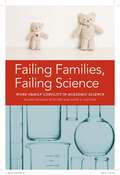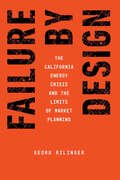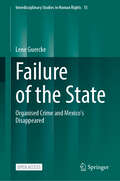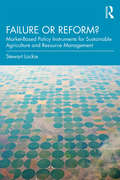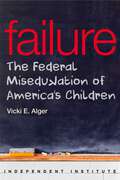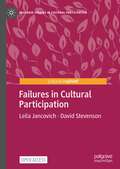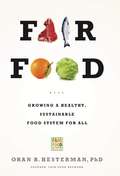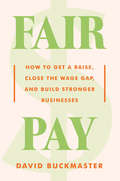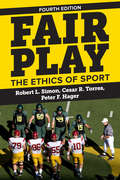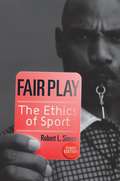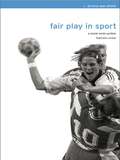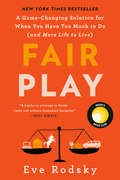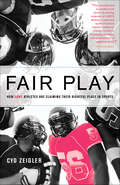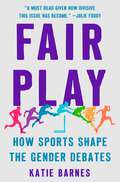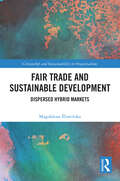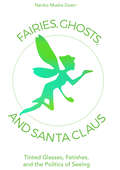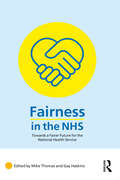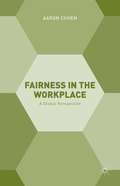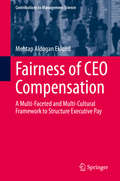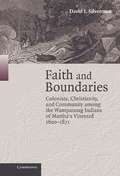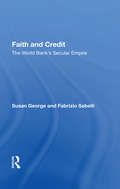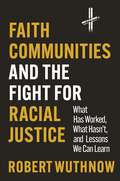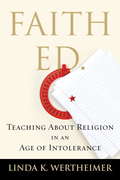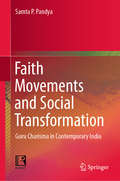- Table View
- List View
Failing Families, Failing Science: Work-Family Conflict in Academic Science
by Elaine Ecklund Anne E. LincolnWork life in academia might sound like a dream: summers off, year-long sabbaticals, the opportunity to switch between classroom teaching and research. Yet, when it comes to the sciences, life at the top U.S. research universities is hardly idyllic. Based on surveys of over 2,000 junior and senior scientists, both male and female, as well as in-depth interviews, Failing Families, Failing Science examines how the rigors of a career in academic science makes it especially difficult to balance family and work.Ecklund and Lincoln paint a nuanced picture that illuminates how gender, individual choices, and university and science infrastructures all play a role in shaping science careers, and how science careers, in turn, shape family life. They argue that both men and women face difficulties, though differently, in managing career and family. While women are hit harder by the pressures of elite academic science, the institution of science—and academic science, in particular—is not accommodating, possibly not even compatible, for either women or men who want to raise families. Perhaps most importantly, their research reveals that early career academic scientists struggle considerably with balancing their work and family lives. This struggle may prevent these young scientists from pursuing positions at top research universities—or further pursuing academic science at all— a circumstance that comes at great cost to our national science infrastructure. In an era when advanced scientific research and education is more important than ever, Failing Families, Failing Science presents a compelling inside look at the world of the university scientists who make it possible—and what universities and national science bodies can do to make a difference in their lives.
Failure by Design: The California Energy Crisis and the Limits of Market Planning
by Georg RilingerA new framework for studying markets as the product of organizational planning and understanding the practical limits of market design. The Western energy crisis was one of the great financial disasters of the past century. The crisis began in April 2000, when price spikes started to rattle California’s electricity markets. Decades later, some blame economic fundamentals and ignorant politicians, while others accuse the energy sellers who raided the markets. In Failure by Design, sociologist Georg Rilinger offers a different explanation, one that focuses on the practical challenges of market design. The unique physical attributes of electricity made it exceedingly difficult to introduce markets into the coordination of the electricity system, so market designers were brought in to construct the infrastructures that coordinate how market participants interact. An exercise in social engineering, these infrastructures were intended to guide market actors toward behavior that would produce optimal market results and facilitate grid management. Yet, though these experts spent their days worrying about incentive misalignment and market manipulation, they unintentionally created a system riddled with opportunities for destructive behavior. Rilinger’s analysis not only illuminates the California energy crisis but also develops a broader theoretical framework for thinking about markets as the products of organizational planning and the limits of social engineering, contributing broadly to sociological and economic thinking about the nature of markets.
Failure of the State: Organised Crime and Mexico's Disappeared (Interdisciplinary Studies in Human Rights #15)
by Lene GuerckeThis Open Access book explores an issue that has received little attention in human rights research: organised criminal groups (OCGs) as perpetrators of human rights violations, especially disappearances. It takes an interdisciplinary approach, combining doctrinal legal research with a qualitative study on present-day disappearances in Mexico. Disappearances are a complex human rights violation that impacts not only the disappeared person but also their relatives, who are left in a limbo of uncertainty about their loved one’s fate. Originally part of state-led repression, today disappearances occur in varied contexts, often involving OCGs and other non-state actors. However, disappearances committed by non-state actors are not human rights violations under International Human Rights Law (IHRL), thereby potentially leaving a gap in the legal protection of victims. The book first analyses state obligations and case law involving state responsibility for human rights violations committed by non-state actors and applies the analysis to OCGs. This ‘internal’ legal perspective is complemented by an ‘external’ study based on interviews with human rights practitioners working on disappearances in Mexico, which often involve OCGs. The qualitative study offers a unique perspective on human rights protection ‘in reality’. The book adds to scholarship on non-state actors and disappearances, and to incipient international legal scholarship on the issue of organised crime and international law. Moreover, the study on Mexico provides a richer understanding of challenges faced by practitioners ‘on the ground’ where OCGs commit human rights violations alongside, or in collusion with, state forces and against the backdrop of an overall failure of the state. The book may be of interest to a diverse audience, including legal scholars and practitioners, human rights scholars in fields such as political science, international relations, or socio-legal studies, as well as funders supporting the work of NGOs in Mexico and similar contexts, and NGOs themselves.
Failure or Reform?: Market-Based Policy Instruments for Sustainable Agriculture and Resource Management
by Stewart LockieMarket reform promises more environmental protection and more profitable agriculture at lower financial cost. Too good to be true? This book examines numerous empirical examples of policy in action to identify principles for the successful application of market-based policy instruments. Where some market instruments are used to fix market failures by putting a value on environmental protection, others use market-like mechanisms to allocate financial incentives for environmental work. They are promoted as flexible, efficient and politically neutral solutions to the competing demands of social, economic and ecological sustainability. But they also attract criticism for rolling back environmental regulation and privatizing public goods. This book argues that while many market-based instruments have merit, decisions about responsibility cannot be left entirely to the market. Whichever instruments we use, decision-making needs to be embedded in a logic of democratization. Using case studies from around the world, this book investigates how instruments like eco-standards, payments for ecosystem services, pollution trading and community-based natural resource management perform in practice, and what can be learned about applying them more effectively. While the approach is primarily sociological, it is deliberately written to bridge the gap between sociology, economics, environmental sciences and the concerns of environmental policy makers.
Failure: The Federal Miseducation of America's Children
by Vicki E. AlgerA comprehensive account and frank assessment of federal involvement in education is long overdue. Education policy expert Vicki E. Alger remedies this deficiency with her book, Failure: The Federal Miseducation of America&’s Children.As its title indicates, Failure makes no effort to sugar coat its findings: Created in 1979, after a lobbying campaign that spanned generations, the Department of Education has failed to live up to its promises. Federal involvement—whether related to testing, funding, or academic curricula—has failed to abide by the Constitution&’s implication that education must remain the domain only of state and local governments and private institutions. Most of all, the central government&’s pervasive meddling in education has failed America&’s school children and their parents. Education policy has long been mired in controversies, often with opposing sides missing the mark. Failure helps us step back from the skirmish du jour and redirects our focus to the big picture, showing us what&’s gone wrong over the decades and the institutional causes of these failures. It also offers a bold blueprint for returning the federal government to its constitutional role and for cultivating an educational system that meets the needs of students and parents, rather than bureaucrats. Concerned citizens of every stripe will benefit from Failure&’s history of federal education policy, its brutally honest report card for the Department of Education, its look at education systems across the globe, and its ambitious policy recommendations. Failure might even succeed in reframing the way the federal education establishment thinks about education policy.
Failures in Cultural Participation (Palgrave Studies in Cultural Participation)
by David Stevenson Leila JancovichThis open access book examines how and why the UK's approach towards increasing cultural participation has largely failed to address inequality and inequity in the subsidised cultural sector despite long-standing international policy discourse on this issue. It further examines why meaningful change in cultural policy has not been more forthcoming in the face of this apparent failure. This work examines how a culture of mistrust, blame, and fear between policymakers, practitioners, and participants has resulted in a policy environment that engenders overstated aims, accepts mediocre quality evaluations, encourages narratives of success, and lacks meaningful critical reflection. It shows through extensive field work with cultural professionals and participants how the absence of criticality, transparency, and honesty limits the potential for policy learning, which the authors argue is a precondition to any radical policy change and is necessary for developing a greater understanding of the social construction of policy problems. The book presents a new framework that encourages more open and honest conversations about failure in the cultural sector to support learning strategies that can help avoid these failures in the future.
Fair Food
by Oran B. HestermanA host of books and films in recent years have documented the dangers of our current food system, from chemical runoff to soaring rates of diet-related illness to inhumane treatment of workers and animals. But advice on what to do about it largely begins and ends with the admonition to "eat local or "eat organic." Fair Food is an enlightening and inspiring guide to changing not only what we eat, but how food is grown, packaged, delivered, marketed, and sold. Oran B. Hesterman shows how our system's dysfunctions are unintended consequences of our emphasis on efficiency, centralization, higher yields, profit, and convenience--and defines the new principles, as well as the concrete steps, necessary to restructuring it. Along the way, he introduces people and organizations across the country who are already doing this work in a number of creative ways, from bringing fresh food to inner cities to fighting for farm workers' rights to putting cows back on the pastures where they belong. He provides a wealth of practical information for readers who want to get more involved.
Fair Pay: How to Get a Raise, Close the Wage Gap, and Build Stronger Businesses
by David BuckmasterLonglisted for the 2021 Porchlight Business Book Awards, Management & Workplace CultureAn expert takes on the crisis of income inequality, addressing the problems with our current compensation model, demystifying pay practices, and providing practical information employees can use when negotiating their salaries and discussing how we can close the gender and racial pay gap.American workers are suffering economically and fewer are earning a living wage. The situation is only worsening. We do not have a common language to talk about pay, how it works at most companies, or a cohesive set of practical solutions for making pay more fair. Most blame the greed of America’s executive class, the ineptitude of government, or a general lack of personal motivation. But the negative effects of income inequality are a problem that can be solved. We don’t have to choose between effective government policy and the free market, between the working class and the job creators, or between socialism and capitalism, David Buckmaster, the Director of Global Compensation for Nike, argues. We do not have to give up on fixing what people are paid. Ideas like Universal Basic Income will not be enough to avoid the severe cultural disruption coming our way.Buckmaster examines income inequality through the design and distribution of income itself. He explains why businesses are producing no meaningful wage growth, regardless of the unemployment rate and despite sitting on record piles of cash and the lowest tax rates[0] in a generation . He pulls back the curtain on how corporations make decisions about wages and provides practical solutions—as well as the corporate language—workers need to get the best results when talking about money with a boss. The way pay works now will not overcome our most persistent pay challenges, including low and stagnant wages, unequal pay by race and gender, and executive pay levels untethered from the realities of the average worker. The compensation system is working as designed, but that system is broken. Fair Pay opens the corporate black box of pay decisions to show why businesses pay what they pay and how to make them pay more.
Fair Play
by Robert L. Simon Cesar Torres Peter HagerAddressing both collegiate and professional sports, the updated edition of Fair Play: The Ethics of Sport explores the ethical presuppositions of competitive athletics and their connection both to ethical theory and to concrete moral dilemmas that arise in actual athletic competition. This fourth edition has been updated with new examples, including a discussion of Spygate by the New England Patriots and recent discoveries on the use of performance enhancing drugs by top athletes. Two additional authors, Cesar R. Torres and Peter F. Hager, bring to this edition a discussion of the moral issues involved in youth sports and the ethics of being a fan, as well as a fresh perspective on the theories of broad internalism and the quest for excellence. Furthermore, major criticisms of broad internalism by philosophers William J. Morgan and Scott Kretchmar add a new dimension to the discussion on the moral foundations of winning.
Fair Play
by Robert L. SimonAddressing both collegiate and professional sports, the revised and updated edition of "Fair Play "explores competitive athletics and their connections to moral dilemmas and ethical theory.
Fair Play in Sport: A Moral Norm System (Ethics and Sport)
by Sigmund LolandFair Play in Sport presents a critical re-working of the classic ideal of fair play and explores its practical consequences for competitive sport. By linking general moral principles and practical cases, the book develops a contemporary theory of fair play.The book examines many of the key issues in the ethics of sport, including:* fairness and justice in sport* moral and immoral interpretation of 'athletic performance'* what makes a 'good competition'* the key values of competitive sport.The notion of fair play is integral to sport as we know and experience it, and is commonly seen as a necessary ethos if competitive sport is to survive and flourish. Fair Play in Sport provides an invaluable guide to the subject for all those with an interest in ethics and the philosophy of sport.
Fair Play: A Game-Changing Solution for When You Have Too Much to Do (and More Life to Live) (Reese's Book Club)
by Eve RodskyA REESE'S BOOK CLUB PICK "A hands-on, real talk guide for navigating the hot-button issues that so many families struggle with."--Reese Witherspoon Tired, stressed, and in need of more help from your partner? Imagine running your household (and life!) in a new way...It started with the Sh*t I Do List. Tired of being the "shefault" parent responsible for all aspects of her busy household, Eve Rodsky counted up all the unpaid, invisible work she was doing for her family -- and then sent that list to her husband, asking for things to change. His response was... underwhelming. Rodsky realized that simply identifying the issue of unequal labor on the home front wasn't enough: She needed a solution to this universal problem. Her sanity, identity, career, and marriage depended on it. The result is Fair Play: a time- and anxiety-saving system that offers couples a completely new way to divvy up chores and responsibilities. Rodsky interviewed more than five hundred men and women from all walks of life to figure out what the invisible work in a family actually entails and how to get it all done efficiently. With four easy-to-follow rules, 100 household tasks, and a series of conversation starters for you and your partner, Fair Play helps you prioritize what's important to your family and who should take the lead on every chore from laundry to homework to dinner. "Winning" this game means rebalancing your home life, reigniting your relationship with your significant other, and reclaiming your Unicorn Space -- as in, the time to develop the skills and passions that keep you interested and interesting. Stop drowning in to-dos and lose some of that invisible workload that's pulling you down. Are you ready to try Fair Play? Let's deal you in.
Fair Play: How LGBT Athletes Are Claiming Their Rightful Place in Sports
by Cyd ZeiglerZeigler tells the story of how sports has been radically transformed for LGBT athletes in the past four years.“Fair Play presents LGBT history and shows how far the movement has come. It’s also an important scrapbook of past and present-day gay athletes who have bravely tested America’s social climate and come out, even when their careers were at risk.” —Bay Area ReporterWhen Cyd Zeigler started writing about LGBT sports issues in 1999, no one wanted to talk about them. Today, this is a central conversation in American society that reverberates throughout the sports world and beyond.In Fair Play, Zeigler tells the story of how sports have transformed for LGBT athletes, diving into key moments and issues that have shaped sports for LGBT people today. He shares intimate behind-the-scenes details about various athletes and stories—including NFL Hall of Famer Michael Irvin, transgender MMA fighter Fallon Fox, and NFL hopeful Michael Sam, among others—along with contextual insights about elite sports, including the overhyped “distraction” myth surrounding gay athletes.Always the forward-thinker, Zeigler maps out the necessary steps to complete sports’ transformation and fully open athletics to LGBT people.Political sportswriter and Edge of Sports imprint curator Dave Zirin (the Nation) has never shied away from criticizing that which die-hard sports fans hold dear. The Edge of Sports titles will address issues across many different sports—football, basketball, swimming, tennis, etc.—and at both the professional and nonprofessional/collegiate levels. Furthermore, Zirin brings to the table select stories of athletes’ journeys and what they are facing and how they evolve both in their sport as well as against the greater backdrop of one’s life’s odyssey.
Fair Play: How Sports Shape the Gender Debates
by Katie BarnesA richly reported and provocative look at the history of women’s sports and the controversy surrounding trans athletes by a leading LGBTQ+ sports journalist.For decades women have been playing competitive sports, thanks in large part to the protective cover of Title IX. Since the passage of that law, the number of women participating in sports and the level of competition in high school and college and professionally, has risen dramatically. In Fair Play, award-winning journalist Katie Barnes traces the evolution of women’s sports as a pastime and a political arena where equality and fairness have been fought over for generations. As attitudes toward gender have shifted to embrace more fluidity in recent decades, sex continues to be viewed as a static binary that is easily determined: male or female. It is on the very idea of static sex that we have built an entire sporting apparatus. Now that foundation is being hotly debated as a result of intense culture wars. Many transgender and intersex athletes, including a South African runner, a wrestler in Texas, a Connecticut track star, and a swimmer at the University of Pennsylvania, have captured the attention of law and policymakers who want to decide how and when they compete. Women’s sports, since their inception, have been seen as a separate class of competition that requires protection and rules for entry. But what are those rules and who gets to make them? Fair Play looks at all sides of the issue and presents a reasoned and much-needed solution that seeks to preserve opportunities for all going forward.
Fair Trade and Sustainable Development: Dispersed Hybrid Markets (Citizenship and Sustainability in Organizations)
by Magdalena ŚliwińskaFair Trade constitutes a social-business initiative that plays a crucial role in the transition towards a "sustainable market economy", countering the major challenges of the 21st century. This research monograph reveals the mechanisms behind this process. It argues that Fair Trade constitutes a new type of market, "a Dispersed Hybrid Market (DHM)", that due to its specific features contributes to a more pro-social functioning of the entire market and taking responsibility for sustainable development by different market participants. It demonstrates, thus, what was underestimated about Fair Trade, and which is extremely important, that it can have a positive impact on the market in terms of sustainable transformation. The book is intended for researchers, lecturers, students, practitioners, and political decision-makers interested in sustainable development, Fair Trade, and transition towards sustainable markets, business, and economy. It contributes to better understanding of sustainability challenges explaining specifics of Fair Trade market, revealing paradoxes and barriers of its development and showing mechanisms of its spillover effects. It also develops arguments about the need to change the role of the state in the face of global challenges and to support such grassroots international initiatives as Fair Trade. Therefore the practical recommendations address both the desired directions of development of the self-governance of this initiative and the expected role of the state towards it, in particular possible ways to strengthen it.
Fairies, Ghosts, and Santa Claus: Tinted Glasses, Fetishes, and the Politics of Seeing
by Neriko Musha DoerrInvestigating the politics of seeing and its effects, this book draws on Slavoj Žižek’s notion of fetish and Walter Benjamin’s notion of the optical unconscious to offer newer concepts: “tinted glasses”, through which we see the world; “unit-thinking”, which renders the world as consisting of discrete units; and “coherants”, which help fragmented experiences cohere into something intelligible. Examining experiences at a Japanese heritage language school, a study-abroad trip to Sierra Leone, as well as in college classrooms, this book reveals the workings of unit-thinking and fetishism in diverse contexts and explores possibilities for social change.
Fairness in the NHS: Towards a Fairer Future for the National Health Service
by Mike Thomas Gay HaskinsThis book is for everyone who is concerned about the successful future of a very special institution – the National Health Service (NHS). It provides the reader with an overview of the complexity of healthcare delivery, and the crucial influence that fairness should have on healthcare planning. The National Health Service Act was approved by Clement Attlee’s Labour Government on 5 July 1948. It was created in a great post-war spirit of community with the aim of providing free care at the point of need for everyone, rich or poor. However, right from the start the NHS has faced issues in tackling the challenges that arise in trying to be fair, and of how greater equity in healthcare can be achieved.The focus is on issues of fairness and equity in healthcare in the NHS, what fairness and equity mean both generally and in the organisational context. It begins with chapters on the inequalities that exist in UK healthcare delivery today. Then a series of chapters focuses on different elements of fairness in healthcare: governance, policy, and leadership; finance and financing; healthcare delivery; the key behaviours required of those working in the NHS and importantly, the patient perspectives.The conclusions and recommendations will be of great interest to health and social care practice staff, health and social care managers and leaders, politicians and policy makers, health and social care specialists, operational managers within the system, NHS boards and healthcare governors, integrated care providers, primary, continuity and specialist providers, and charities in the healthcare sector. It will also be of interest to academics and others involved in training, research and development, students studying health, social care, and management and to the wider public: to everyone who is concerned about the successful future of a very special institution – the National Health Service.
Fairness in the Workplace
by Aaron CohenFairness in the Workplace takes a multi-dimensional approach to the concept of organizational fairness, one that views organizational fairness as being comprised of procedural justice, organizational politics, organizational trust, and psychological contract breach, all of which are indicators of the global evaluation of the (un)fairness of the organization. This evaluation, in turn, predicts the employees' attitudes and behaviors. Such an approach moves from a simplified view of the focalconstructs as unique perceptions to a more nuanced understanding of each construct as representing one aspect of the overall assessment of the organization as fair or unfair. By combining them into a concept that represents a higher level of abstraction, we can develop a robust scale with which to measure organizational (un)fairness that has the potential to improve our predictions about employees' attitudes and behaviors. This approach expands existing motivation theories. Furthermore, the book covers the relationship between organizational fairness and organizational outcomes.
Fairness of CEO Compensation: A Multi-Faceted and Multi-Cultural Framework to Structure Executive Pay (Contributions to Management Science)
by Mehtap Aldogan EklundExecutive compensation and its fairness to stakeholders are topics of heated debate on platforms ranging from news forums to financial markets. This book stimulates critical thinking on executive compensation and guides academics and practitioners on the key concepts by developing a multi-faceted and multi-cultural framework. It also presents the new ‘Fair CEO Compensation,’ which uses a scientifically developed and structured stakeholder-based approach to reach optimal and fair CEO compensation, without capping bonuses or variable pay by rules and regulations. Financial, non-financial, organizational, strategic, cultural, personal, and social aspects are all taken into account in the framework. In addition to implementation guidelines and real-world examples, the book presents a checklist for businesses to measure the fairness of their CEO compensation based on the suggested framework. Moreover, the author also provides a survey template to help businesses investigate their employees’ perception of the fairness of their CEO’s compensation.
Fairness, Class and Belonging in Contemporary England
by Katherine SmithUsing experiences of the white, English, working-classes in Manchester, this book explores the local frustrations with feeling 'ignored' and 'neglected' by the government through articulations of fairness.
Faith And Boundaries: Colonists, Christianity, And Community Among The Wampanoag Indians Of Martha's Vineyard, 1600-1871
by David J. SilvermanIt was indeed possible for Indians and Europeans to live peacefully in early America and for Indians to survive as distinct communities. Faith and Boundaries uses the story of Martha's Vineyard Wampanoags to examine how. On an island marked by centralized English authority, missionary commitment, and an Indian majority, the Wampanoags' adaptation to English culture, especially Christianity, checked violence while safeguarding their land, community, and ironically, even customs. Yet the colonists' exploitation of Indian land and labor exposed the limits of Christian fellowship and thus hardened racial division. The Wampanoags learned about race through this rising bar of civilization - every time they met demands to reform, colonists moved the bar higher until it rested on biological difference. Under the right circumstances, like those on Martha's Vineyard, religion could bridge wide difference between the peoples of early America, but its transcendent power was limited by the divisiveness of race.
Faith And Credit: The World Bank's Secular Empire
by Susan GeorgeThe authors compare the ideologies of the free-market with religious faith, giving the World Bank the role of a secular church setting out to convert the world's underdeveloped economies to the consumer capitalist way, and so to create an enormous secular empire. This book is published in September 1994 to coincide with the World Bank's 50th annive
Faith Communities and the Fight for Racial Justice: What Has Worked, What Hasn't, and Lessons We Can Learn
by Robert WuthnowThe communities, congregations, and faith-based coalitions that have been working for racial justice over the past fifty yearsHave progressive religious organizations been missing in action in recent struggles for racial justice? In Faith Communities and the Fight for Racial Justice, Robert Wuthnow shows that, contrary to activists&’ accusations of complacency, Black and White faith leaders have fought steadily for racial and social justice since the end of the Civil Rights movement of the 1950s and 1960s. Wuthnow introduces us to the communities, congregations, and faith-based coalitions that have worked on fair housing, school desegregation, affirmative action, criminal justice, and other issues over many years. Often overshadowed by the Religious Right, these progressive faith-based racial justice advocates kept up the fight even as media attention shifted elsewhere.Wuthnow tells the stories of the faith-based affordable housing project in St. Louis that sparked controversy in the Nixon White House; a pastor&’s lawsuit in North Carolina that launched the nation&’s first busing program for school desegregation; the faith outreach initiative for Barack Obama&’s presidential campaign; and church-mobilized protests following the deaths of Trayvon Martin, Freddie Gray, and George Floyd. Drawing on extensive materials from denominations, journalists, and social scientists, Wuthnow offers a detailed and frank discussion of both the achievements and the limitations of faith leaders&’ roles. He focuses on different issues that emerged at different times, tracing the efforts of Black and White faith leaders who sometimes worked cooperatively and more often tackled problems in complementary ways. Taken together, these stories provide lessons in what faith communities have done and how they can better advocate for racial justice in the years ahead.
Faith Ed
by Linda K. WertheimerAn intimate cross-country look at the new debate over religion in the public schools A suburban Boston school unwittingly started a firestorm of controversy over a sixth-grade field trip. The class was visiting a mosque to learn about world religions when a handful of boys, unnoticed by their teachers, joined the line of worshippers and acted out the motions of the Muslim call to prayer. A video of the prayer went viral with the title "Wellesley, Massachusetts Public School Students Learn to Pray to Allah." Charges flew that the school exposed the children to Muslims who intended to convert American schoolchildren. Wellesley school officials defended the course, but also acknowledged the delicate dance teachers must perform when dealing with religion in the classroom.Courts long ago banned public school teachers from preaching of any kind. But the question remains: How much should schools teach about the world's religions? Answering that question in recent decades has pitted schools against their communities.Veteran education journalist Linda K. Wertheimer spent months with that class, and traveled to other communities around the nation, listening to voices on all sides of the controversy, including those of clergy, teachers, children, and parents who are Muslim, Jewish, Christian, Sikh, or atheist. In Lumberton, Texas, nearly a hundred people filled a school-board meeting to protest a teacher's dress-up exercise that allowed freshman girls to try on a burka as part of a lesson on Islam. In Wichita, Kansas, a Messianic Jewish family's opposition to a bulletin-board display about Islam in an elementary school led to such upheaval that the school had to hire extra security. Across the country, parents have requested that their children be excused from lessons on Hinduism and Judaism out of fear they will shy away from their own faiths.But in Modesto, a city in the heart of California's Bible Belt, teachers have avoided problems since 2000, when the school system began requiring all high school freshmen to take a world religions course. Students receive comprehensive lessons on the three major world religions, as well as on Sikhism, Hinduism, Buddhism, and often Shintoism, Taoism, and Confucianism. One Pentecostal Christian girl, terrified by "idols," including a six-inch gold Buddha, learned to be comfortable with other students' beliefs. Wertheimer's fascinating investigation, which includes a return to her rural Ohio school, which once ran weekly Christian Bible classes, reveals a public education system struggling to find the right path forward and offers a promising roadmap for raising a new generation of religiously literate Americans.
Faith Movements and Social Transformation: Guru Charisma In Contemporary India
by Samta P. PandyaThis book examines the role of Hindu-inspired faith movements (HIFMs) in contemporary India as actors in social transformation. It further situates these movements in the context of the global political economy where such movements cross national boundaries to locate believers among the Hindu diaspora and others. In contemporary neoliberal India, HIFMs have become important actors, and they realize themselves by making public assertions through service. The four pillars of the contemporary presence of such movements are: gurus, sociality, hegemony and social transformation. Gurus, who spearhead these movements, create a matrix of possible meanings in their public discourses which their followers pick up to create messages of personal and social change. Sociality is a core strategy of proliferation across such movements and implies social service, which is qualified by memories of the guru and what they are believed to embody. Hegemony is reflected in the fact that social service in such movements often ominously imbibes right-wing or far-right Hinduism. They propose a model of Hindu-inspired social transformation, involving faith building into and transforming the civil society. The book discusses in a nuanced way several Hindu-inspired faith movements of various hues which have made national and international impact.This topical book is of interest to students and researchers in the fields of sociology, anthropology, social work, and social psychology, with a special interest in the study of religious movements.
